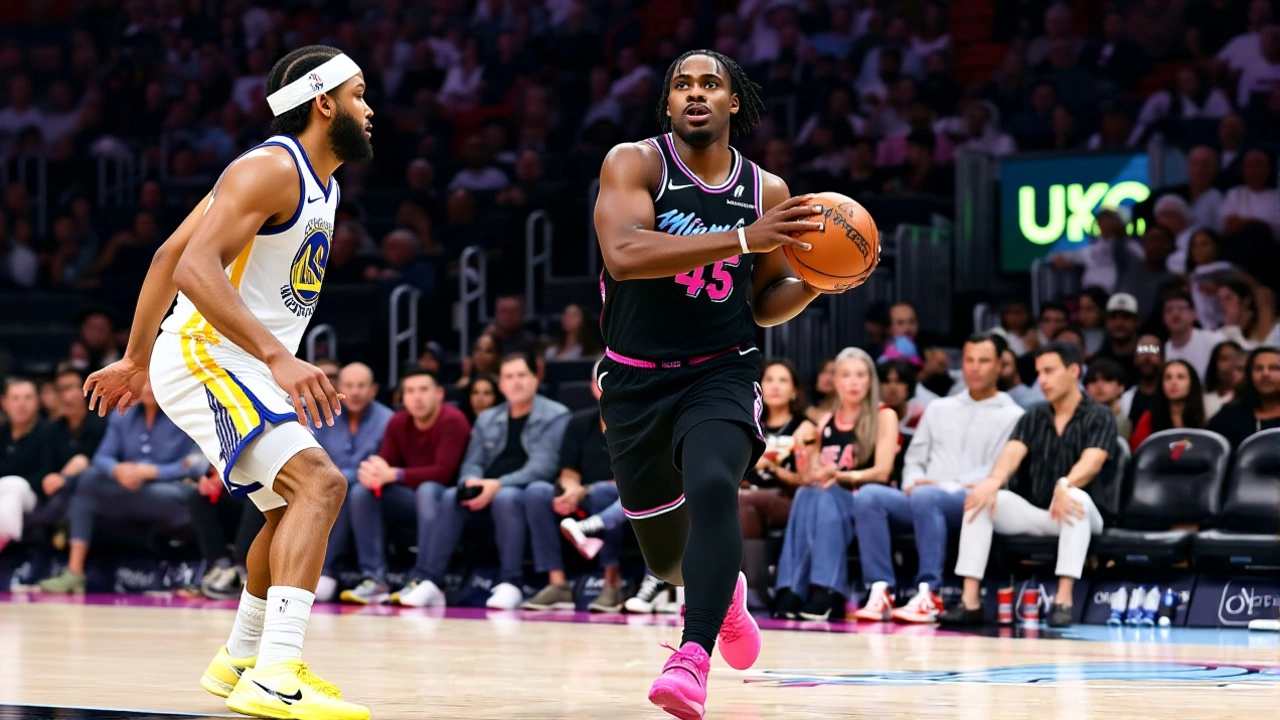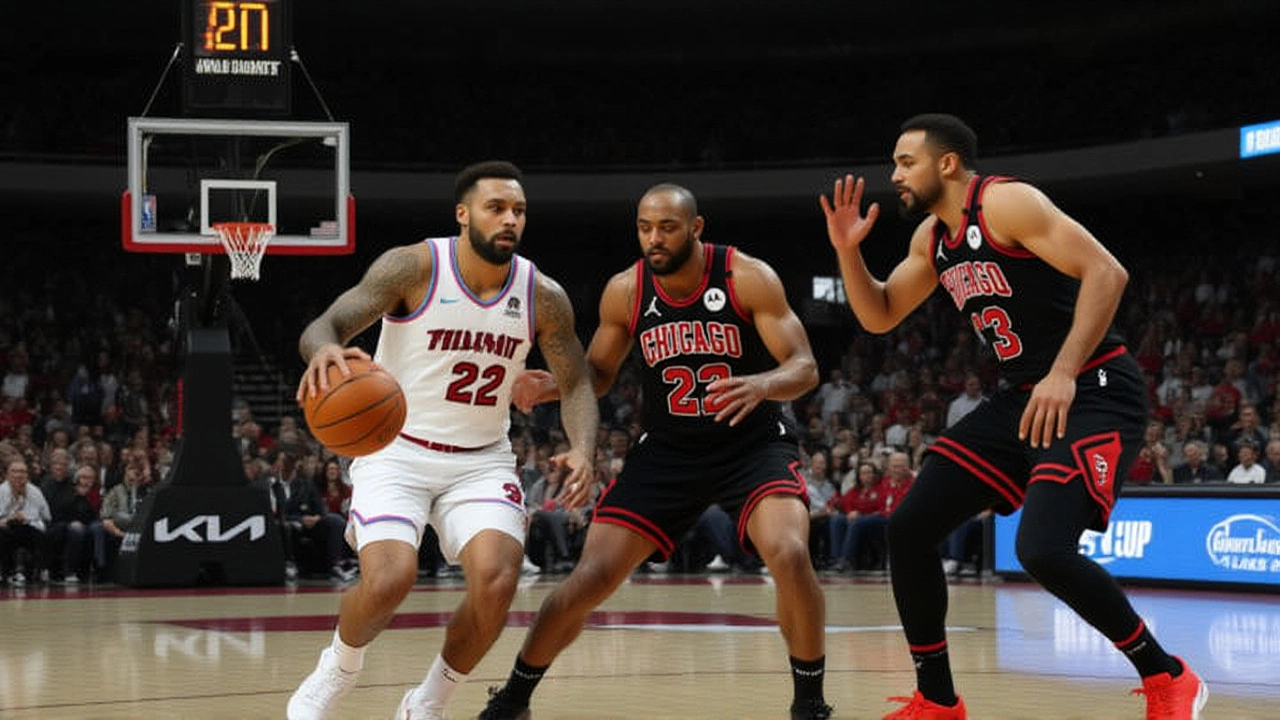The Miami Heat didn’t just beat the Chicago Bulls on Friday, November 21, 2025—they erased them. In a stunning 143-107 demolition at the United Center in Chicago, the Heat delivered the Bulls’ worst loss of the season and announced themselves as the most dangerous team in the Emirates NBA Cup’s Group C. The final margin? 36 points. The Bulls’ largest deficit of the year. And for Miami? Their most explosive offensive performance since the season tipped off.
A Night of Breakneck Pace and Defensive Fury
The Heat didn’t just score—they sprinted. They forced 19 turnovers, turned them into 28 fast-break points, and ran the floor like a team possessed. Analysts on YouTube highlights called them “the number one pace team in the league,” and it wasn’t hyperbole. Their 36-point first quarter was the highest-scoring opening frame of their season. Then came the second: 34 points while holding Chicago to 20. That’s not just defense. That’s psychological warfare.
At the center of it all was Kel'el Ware, the 21-year-old center from Florida. He didn’t just dominate the paint—he owned it. 20 points, 14 rebounds, two steals. And with his 22nd block of the season in the third quarter, he became the youngest Heat player since 2000 to post back-to-back 10-rebound, 2-block games. He wasn’t just stopping shots—he was altering the entire rhythm of the Bulls’ offense.
Chicago’s Collapse: From West Coast Highs to Chicago Low
Just days before, the Bulls had wrapped up a tough two-game road trip in the West with wins over Phoenix and Sacramento. They were riding high. Their drive-and-kick offense, led by Ayo Dosunmu (23 points, 4 assists), had looked fluid, even lethal. But Friday night, everything froze. The ball stuck. The shots clanged. The defense vanished.
Coach Billy Donovan’s team managed only 20 points in the second quarter—their lowest of the season. Josh Giddey, the Australian playmaker, finished with just 8 points on 3-of-13 shooting. Veteran Nikola Vucevic, who was misidentified as “Pella Larson” in some fan transcripts, was held to 12 points and 7 rebounds, far below his 20-point average. The Bulls had no answer for Miami’s switching defense, and their trademark rhythm? Gone.
Miami’s Depth: More Than Just Ware and Powell
Let’s be clear: this wasn’t a two-man show. Norman Powell, the 32-year-old Canadian sharpshooter, was surgical—19 points, 2 steals, 4-of-6 from deep. But the real story was the supporting cast. Bam Adebayo, the All-Star center, played just 26 minutes and still dropped 14 points, 9 rebounds, and 5 assists. Jamie Jaquez Jr., the 23-year-old forward, had 16 points and 7 boards, playing with the grit of a veteran. Even Nikola Jovic, the 20-year-old Serbian forward, chipped in 11 points off the bench, showing why Miami’s young core is becoming the league’s most feared.
And yes, the transcript errors were real. “Herder” for Tyus Jones? “Hake Fontio” for Jaquez? “Muchovic” for Jovic? Those were fan mishearings—probably from a noisy arena or a bad audio feed. But they became memes. And in today’s NBA, memes become momentum.

The Bigger Picture: Group C and the Road to the Cup
With this win, the Heat improved to 10-6 on the season and moved into a tie for first in Emirates NBA Cup Group C, alongside the Atlanta Hawks. The Bulls, now 8-7, dropped into a three-way tie for third. But the implications stretch beyond the Cup. Miami’s 36-point win was the largest in the NBA this season. It was also the first time since 2020 that a team scored 140+ points against Chicago.
Meanwhile, in the Central Division, the Detroit Pistons (13-2) remain the class of the division. The Bulls? They’re now five games back. And with the Heat rolling, the playoff picture in the East is getting more chaotic—and more exciting.
What’s Next? The Heat’s Trajectory
Miami’s next three games are all against playoff-caliber teams: Orlando, Boston, and Philadelphia. If they keep playing with this pace, this intensity, and this depth, they won’t just win the Emirates Cup—they’ll be a top-three seed in the Eastern Conference. Their offense ranks first in the league in points per 100 possessions. Their defense? Top 5 in deflections. They’re not just good. They’re building something special.
As for Chicago? They need to ask hard questions. Is their offense too reliant on Dosunmu? Are they too thin at center? Can they adjust before the trade deadline? The answers will define their season.
Frequently Asked Questions
How did the Miami Heat’s pace affect the Chicago Bulls’ offense?
Miami’s league-leading pace forced Chicago into a frantic, out-of-rhythm style of play. The Bulls, normally elite at drive-and-kick offense, struggled to set up their plays as Miami’s defenders constantly pressured the ball, forcing 19 turnovers and turning them into 28 fast-break points. Chicago’s average time per possession dropped from 14.2 seconds to just 11.8, disrupting their rhythm and leading to rushed, low-percentage shots.
Why was Kel’el Ware’s performance so significant?
Ware’s 20-point, 14-rebound, 2-block night marked his third straight double-double and made him the youngest Heat center since Shaquille O’Neal to post three consecutive 14-rebound games. His rim protection (22 blocks this season) has transformed Miami’s defense from average to elite, and his offensive mobility allows them to play small-ball without sacrificing interior presence.
What does this loss mean for the Chicago Bulls’ playoff chances?
With their record falling to 8-7 and now five games behind the Detroit Pistons in the Central Division, the Bulls’ path to a top-6 seed is narrowing. They’ve lost two straight for the first time this season, and their defense has allowed 115+ points in three of their last four games. Without a major trade or a defensive turnaround, they risk falling into the play-in tournament.
How does the Emirates NBA Cup impact regular-season standings?
Wins in the Emirates NBA Cup count toward regular-season records, and group winners earn a playoff berth in the Cup’s knockout stage. Miami’s 10-6 record includes three Cup wins, giving them momentum and a potential home-court advantage in the Cup semifinals. For Chicago, this loss makes their group-stage survival uncertain—they now need to win at least two of their final three Cup games to advance.
What’s the significance of Miami’s 36-point first quarter?
It was the highest-scoring opening quarter by any NBA team this season and the first time Miami has broken 35 points in the first 12 minutes. They shot 63% from the field, including 7-of-11 from three, and had 10 assists on 12 made baskets. The energy set the tone for the entire game and exposed Chicago’s lack of defensive discipline early—a pattern that continued all night.
Were the player name errors in the YouTube transcript real?
Yes. The transcript mistakenly labeled Tyus Jones as “Herder,” Jaime Jaquez Jr. as “Hake Fontio,” and Nikola Jovic as “Muchovic.” These were audio mishearings, likely from crowd noise or poor commentary clarity. The errors went viral on social media, but they don’t reflect official game data. NBA.com and ESPN’s official box scores correctly listed all players.

